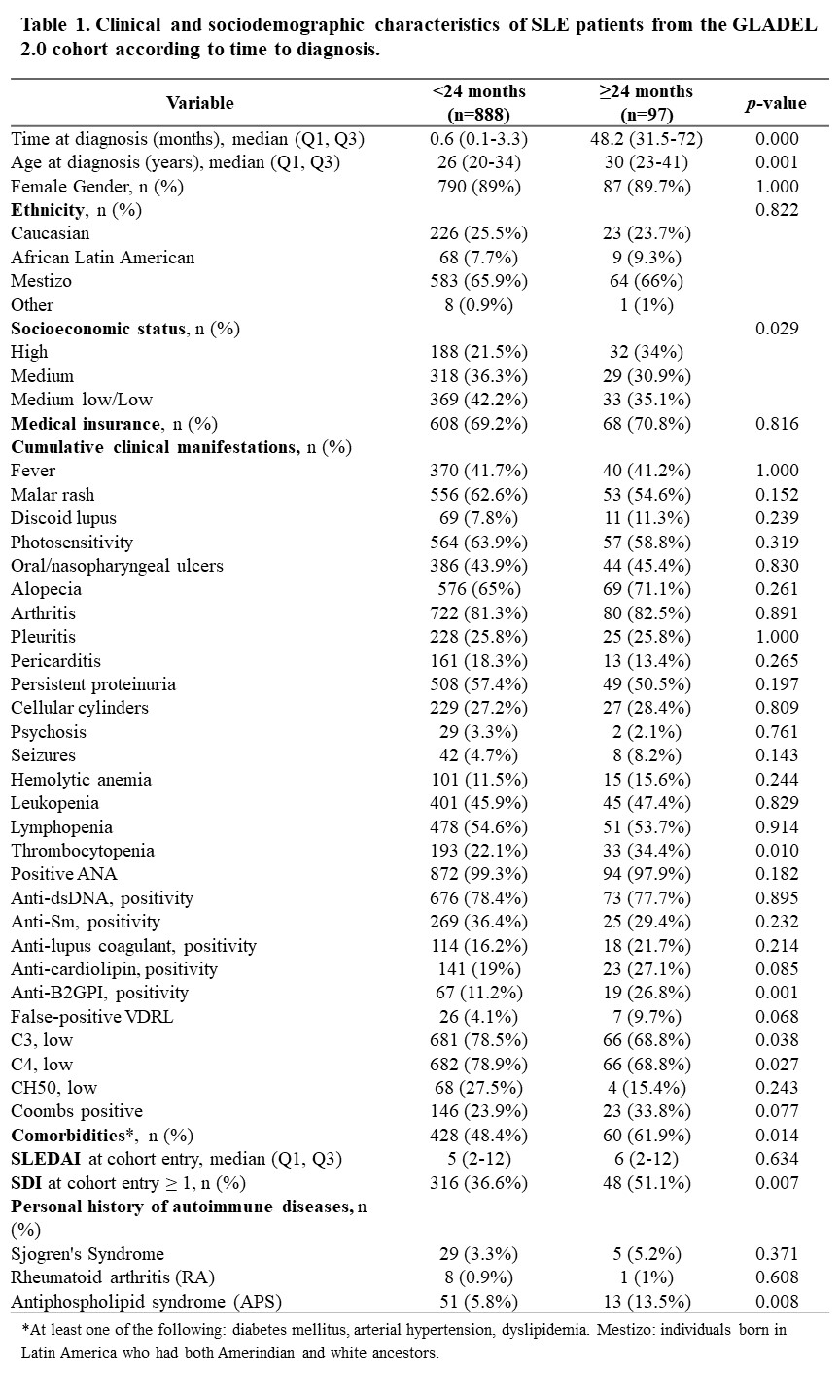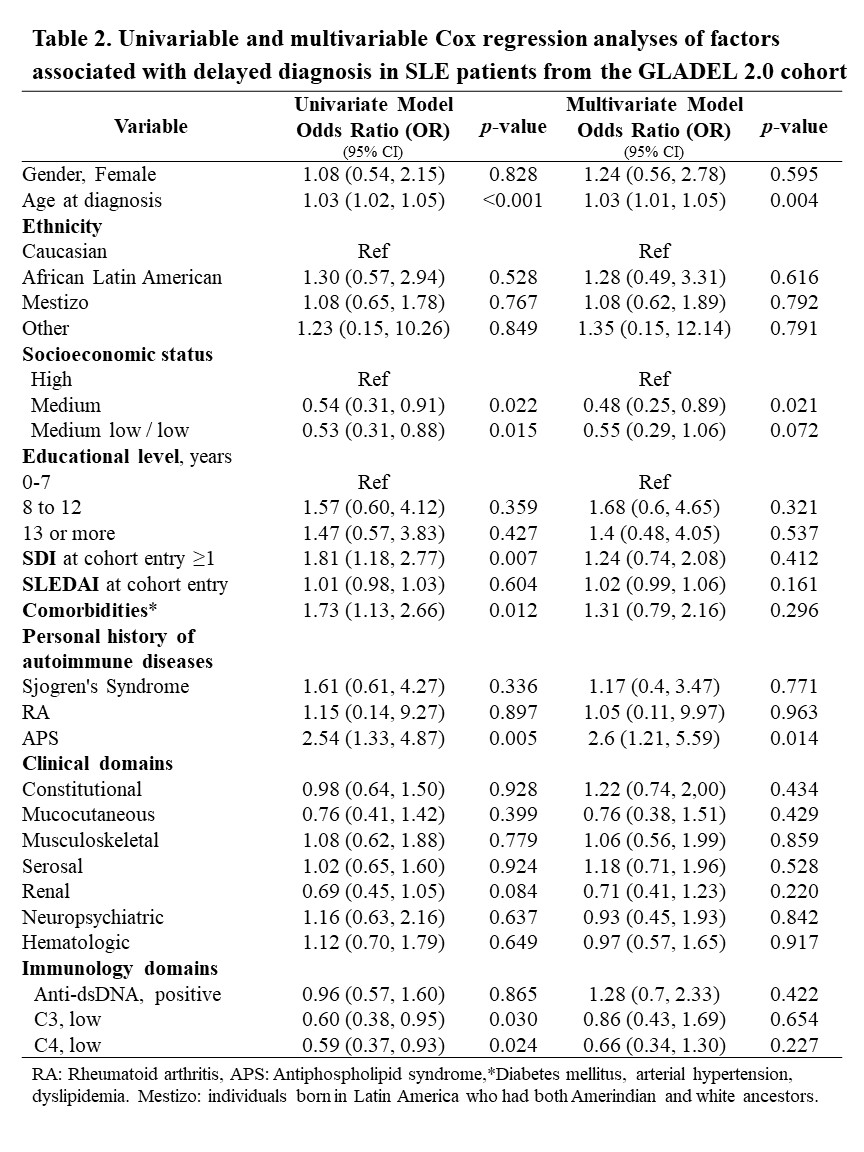Session Information
Session Type: Poster Session A
Session Time: 10:30AM-12:30PM
Background/Purpose: Systemic lupus erythematosus (SLE) is a multi-systemic autoimmune disease of unknown etiology. Diagnosis is often delayed because it frequently mimics symptoms of other diseases; this also delays treatment initiation. Previous studies have reported that this delay in diagnosis is associated with a worse prognosis including higher disease activity, damage accrual, decreased quality of life and increased use of healthcare resources and, therefore, higher costs. In the GLADEL original cohort, a maximum time to SLE diagnosis of 24 months did not negatively influence disease outcomes (damage accrual and mortality)1. This study aimed to characterize delay in the diagnosis in SLE patients and its associated factors.
Methods: GLADEL 2.0 is an observational multi-ethnic, multi-national Latin-American SLE cohort. Forty-three centers from 10 Latin-American countries enrolled patients ≥18 years of age who fulfilled the 1982/1997 American College of Rheumatology (ACR) and/or the 2012 Systemic Lupus International Collaborating Clinics (SLICC) classification criteria. Patients were categorized into 4 subsets according to the presence or absence of active or inactive lupus nephritis (LN)2. Baseline demographics, clinical manifestations, disease activity (SLEDAI-2K) and SLICC/ACR damage index (SDI) and treatments were examined. Based on the original GLADEL report, variables were examined according to time to diagnosis shorter versus equal or longer than 24 months, as no impact was found on outcomes before this time1. Continuous variables are summarized as median (Q1, Q3) and categorical variables as counts and percentages. Logistic regression models were used to identify factors independently associated with a delay in diagnosis ≥24 months. P-values < 0.05 were considered significant. All analyses were done using R v4.4.0
Results: Of the 1083 patients included in this GLADEL cohort, 985 were included in these analyses. The remaining patients were excluded because of insufficient data for analysis. The median time to diagnosis was 8 months (0.27–5.67); in 97 patients (9.84%) the time to diagnosis was longer than 24 months. Table 1 depicts the sociodemographic and clinical characteristics of SLE patients according to time to diagnosis. Patients with a time to diagnosis greater than 24 months were found to be older at diagnosis, having a higher frequency of thrombocytopenia, associated comorbidities, antiphospholipid syndrome (APS), anti-B2GPI positivity and cumulative damage with lower frequency of low complement at cohort entry. After adjusting for sociodemographic, clinical and immunologic features, multivariate analysis showed that older age, middle socioeconomic status and associated APS were associated with a higher probability of diagnostic delay (Table 2).
Conclusion: In the GLADEL 2.0 multiethnic cohort, we found that delay in diagnosis was more likely to occur in older SLE patients and it was associated with APS. Future analyses will allow us to identify the impact of delayed diagnosis on outcome of SLE patients.
Reference:
1. Nieto R, et al. Lupus. 2024;33(4):340-346.
2. Gómez-Puerta JA, et al. Lupus. 2021;28:961203320988586.
To cite this abstract in AMA style:
Nieto R, Hernandez L, Merás N, Juliana B, Otaduy C, Garcia L, Serrano Morales R, Pérez N, Cosatti M, Montandon A, Chapacais G, Alves Alvino L, Figuereido Neves E, Bonfa E, Peralta A, Massardo L, Cadena Bonfanti A, Hormaza A, Martínez J, Vera Lastra O, Fragoso-Loyo H, Juárez-Vicuña �, Fernandez D, Langjarth P, Martinez de Filartiga M, Ugarte-Gil M, Loayza Flores C, Polanco T, Belen Lecumberri M, Danza Á, Toro-Gutierrez C, Sbarigia U, Orillion A, Zazzetti F, Alarcon G, Pons-Estel B, Pons-Estel G. Delayed Diagnosis in Systemic Lupus Erythematosus [abstract]. Arthritis Rheumatol. 2024; 76 (suppl 9). https://acrabstracts.org/abstract/delayed-diagnosis-in-systemic-lupus-erythematosus/. Accessed .« Back to ACR Convergence 2024
ACR Meeting Abstracts - https://acrabstracts.org/abstract/delayed-diagnosis-in-systemic-lupus-erythematosus/


